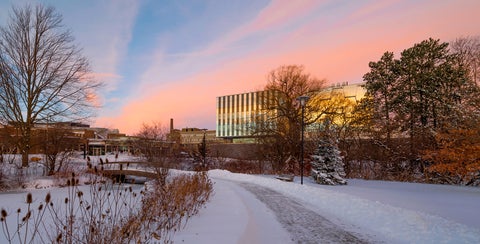
Photo credit: Joe Petrik, Cheriton School of Computer Science
2023 was a year to remember for the Waterloo Math community! From solving a 60-year-old math problem to AI-driven breakthroughs in personalized medicine, we demonstrated our unique ability to advance mathematical understanding while solving real-world problems.
Here are some highlights:
Fun on Pi Day
In March, we celebrated Pi Day with alumni around the world. The Faculty shared a video about our recent accomplishments and alumni in Waterloo, Toronto, Vancouver, Seattle, San Francisco or New York had a chance to receive free pie at local pie shops.
Recognizing exceptional alumni
The Faculty of Mathematics announced its most recent Alumni Achievement Medal recipients. The awards committee chose 5 winners for each medal: one for each year from 2019 to 2021 and two for 2022 in recognition of it being the 20th anniversary of the Alumni Achievement Medal and the 10th anniversary of the Young Alumni Achievement Medal [which will henceforth be known as the Graduate of the Last Decade (G.O.L.D.) Alumni Award].

New research showcase event
In April, the Math Innovation Office held its inaugural Research Discovery Days, a research showcase and networking event. Day one featured a keynote presentations by Canada 150 Research Chair and Applied Mathematics professor Anita Layton, Professor in the Department of Combinatorics and Optimization and co-founder of the of the Institute for Quantum Computing Michele Mosca (BMath ’95), and Computer Science professor and Head of Apple Knowledge Platform Ihab Ilyas. On day two, Steve Woods (PhD ’96), an alum of Waterloo’s Computer Science graduate programs and the founder of several successful tech companies, gave a fireside chat-style keynote. The sec
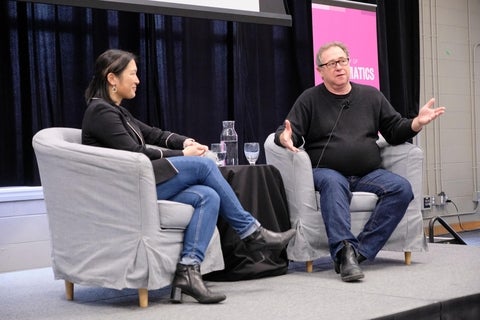
Celebrating Women in Math
On May 12, the Waterloo Women’s Impact Network (WWIN) celebrated International Women in Mathematics Day with round-table discussions and a presentation by Hilary Bergsieker, associate professor of psychology at the University of Waterloo, about how to create inclusive cultures in STEM. Bergsieker spoke about her work with Engendering Success in Stem, a research consortium that aims to better understand and combat the various ways that cultural biases stand in the way of creating inclusive cultures in STEM.
Finding the elusive einstein tile
An international team of four that included Cheriton School of Computer Science professor Craig Kaplan (BMath ’96) discovered a single shape that tiles the plane — an infinite, two-dimensional surface — in a pattern that can never be made to repeat. The shape, a 13-sided polygon they called “the hat,” is known to mathematicians as an aperiodic monotile or an “einstein.” Just a few months after this initial discovery, the team found another shape, related to the first, that meets an even stricter definition. Dubbed the “spectre,” the new shape tiles a plane in a pattern that never repeats without the use of mirror images of the shape.
The discoveries mesmerized mathematicians, tiling enthusiasts and the public alike. TIME magazine named the aperiodic monotile as one of the best inventions of 2023
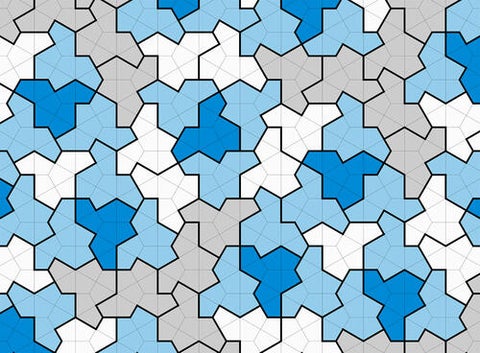
CS students win the International Collegiate Programming Contest
A team of three Waterloo algorithmic programmers topped the competition at the 2023 International Collegiate Programming Contest North America Championship, held on May 29 at the University of Central Florida. Waterloo overcame the competition, including trios of programmers from Stanford, Carnegie Mellon, MIT, Harvard and the University of Toronto.
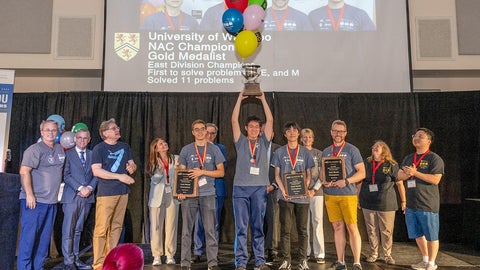
Autonomous racing team achieves personal best
Math students on a multi-school autonomous racing team achieved a personal best speed of 173.8 kph at a race on the Monza F1 Circuit in Milan, Italy. The race, which featured five teams with members from universities around the world, was the Waterloo students’ fifth race, and the first on a road course rather than a banked oval track.
Pragamatica wins big in Velocity 5K Finals
Pragmatica, a startup that aims to make speech therapy more accessible via VR, was one of four winners of $5000 at the Velocity $5K Finals in July. Pragmatica is a joint venture by Computer Science master’s student Karthik Prasad and recent Waterloo Engineering graduate Thomas Mastantuono. They were among the seven finalists chosen from the twenty-three teams competing in the semi-finals.
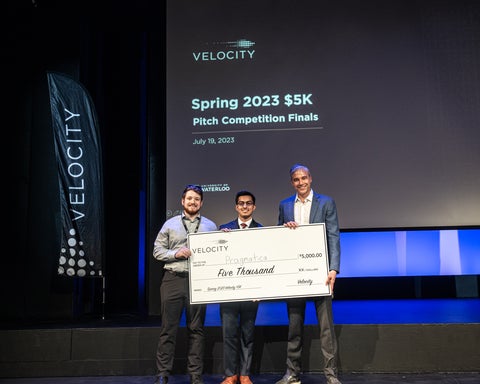
Creating quantum resilient cryptography

Showcasing interdisciplinary research
In September, the Faculty of Mathematics hosted the Math + X Inter-Faculty Research Workshop. More than 40 researchers from all six Waterloo faculties gathered to discuss the theme of “Data + Computation for the 5 Global Futures” and explore how they could collaborate to harness the power of data in their respective fields.
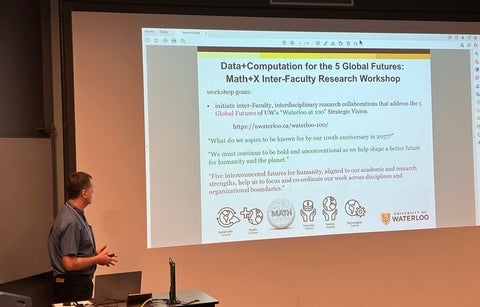
Saving the coral reefs
A team of researchers in the Faculty of Mathematics are using mathematical models to help determine the best strategies for saving coral reefs from climate change. As havens of biodiversity, coral reefs are some of the world's most important ecosystems – and some of the most vulnerable to the impacts of climate change. While the world's reefs face numerous intersecting threats, the Waterloo team focused on predicting outbreaks of crown-of-thorns (CoT) starfish.
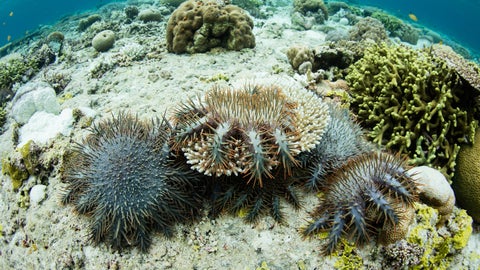
Modelling complex cancers
An international team of interdisciplinary researchers has successfully created a method for better 3D modelling of complex cancers. The University of Waterloo-based team combined cutting-edge bioprinting techniques with synthetic structures or microfluidic chips. The method will help lab researchers more accurately understand heterogeneous tumours: tumours with more than one kind of cancer cell, often dispersed in unpredictable patterns.

Waterloo partners with Rogers
In November, the University of Waterloo welcomed Rogers Communications leadership to campus to celebrate the renewal of the Rogers 5G partnership to advance 5G research and development in Canada. This builds on the three-year agreement announced by Rogers in 2020 with the University to advance 5G research in the Toronto-Waterloo tech corridor. This includes the work of Dr. Raouf Boutaba, a professor and director of the Cheriton School of Computer Science, and his team, who are collaborating with Rogers to validate various 5G-related pilot projects.
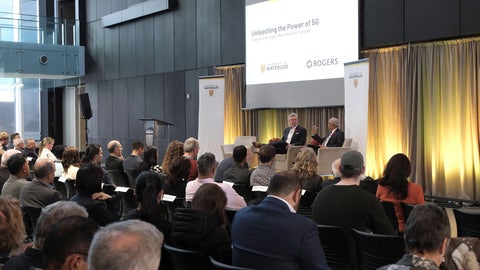
Russell Hisock gives to M4
Russell Hiscock (BMath ’75), the former President and CEO of the CN Investment Division, made a very significant gift to establish the Russell Hiscock Statistics and Actuarial Science Lab in the new Mathematics 4 building. The lab will be used to advance research within the Department of Statistics and Actuarial Science and create unique learning opportunities for students. Part of Hiscock’s gift will establish a graduate scholarship in statistics and actuarial science.
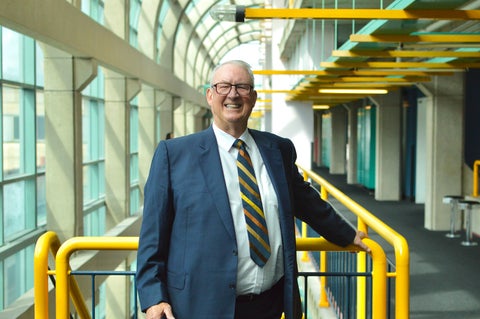
Using AI for personalized medicine
Researchers at the Cheriton School of Computer Science have applied machine learning to identify tumour-specific antigens, which could help make personalized cancer vaccines practically feasible and more accurate.
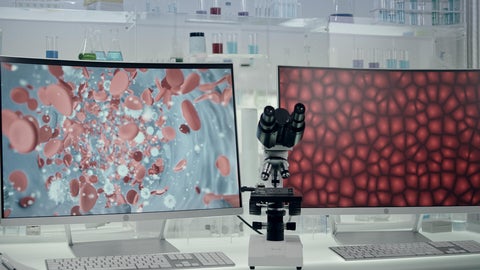
Stay connected
You can stay connected by reading Math E-Ties, our alumni e-newsletter. In it, you’ll find event information, faculty news and alumni success stories. To subscribe to E-Ties, please contact mathalumni@uwaterloo.ca.